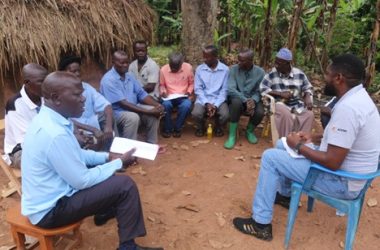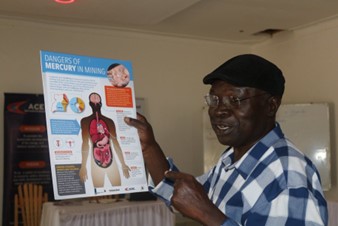Artisanal and small-scale gold miners operating in Kisita are bracing for uncertain times as a six-month November eviction deadline draws nearer.
The eviction notice which came as a presidential directive mirrors the August 4, 2017 lightning operation that saw over 60,000 miners evicted from the then Mubende mines in Kitumbi sub county, causing loss of livelihoods, property, equipment, gold and money that they to date estimate in billions of shillings.
Only this time, the over 30,000 miners were given a notice to vacate the mining area licensed to Kisita Mining Company in Kassanda district.
Edward Ssenkusu, the community development officer Kitumbi sub county, says he has so far invested over one hundred million and employing a number of artisanal miners at his pit.
“My pit is 300 feet deep; it is well constructed and secured with struts for the safety of miners. All that investment is going to go to waste,” he laments, noting that there are about 150 miners who have invested that kind of money and above.
He says the miners had formed an association, Kisita Artisanal and Small-scale Miners and Processors Association, and were negotiating with the company to let them work on part of their concession, but there was a lot of disorganization among themselves and those of another company, Kitumbi Small-scale Miners that had bought shares in Kisita Mining Company.
“There are a lot of divisions amongst the different groups which made the negotiations difficult much as the company was willing, we were very disorganised,” he says, adding that a number of the ASMs however had left for a gold rush in Lubaali and Lugongwe.
The issue of the Kisita ASMs came to light following an impasse involving the company, Uganda Revenue Authority and the Minerals Police Protection Unit.
A shocking footage made rounds on social media showing a standoff involving the minerals police and army personnel in the company of a resident district commissioner.
The RDC whose involvement in the matter remains obscure, had stormed the mine site only to be blocked by the minerals police personnel in heated exchange was miraculously ended without incident.
The minerals police, under command of Jessica Keigomba, had taken over management of the mines denying the company owners access to the site. On an impromptu visit by Sarah Opendi, then the state minister for energy and minerals development, together with Uganda Revenue Authority officials, the minerals police unit deployed at the mines blocked them.
The company owed URA officials over a billion shillings in unpaid taxes.
The unusual developments led to the intervention of the State House anti-corruption led by Ruth Nakalema, who summoned a meeting that was attended by Opendi, the minerals police commandant Jessica Keigomba, and other police chiefs.
A Turkish investor, Mustafa Semils Feigil, complained how the minerals police personnel were harassing him and threatening him with deportation.
At that particular meeting, Nakalema caused the arrest of one Keigomba’s officers, Caleb Tashobya, for disobeying lawful orders from his superiors and frustrating investors.
A key resolution that came out of that meeting was the staying of the eviction of ASMs from the mines as investigations into the Turkish investor’s complaint of being forced out of the company were ongoing.






